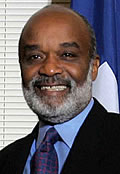mulattoes struggle political rights 2
< Previous | Home | Next >
Reply to Msg 9039
>>Beauvais Chief of the Militia<<
For a while the white colonists forgot their own differences and united firmly against their common enemy: The mulattoes.
In their turn they succeeded in stirring up against the Afranchis men the slaves of Fond-Parisien, and of the Cul-de-Sac plain.
The revolt broke out on January 23, 1793. Thirty-three plantations belonging to mulattoes families were reduced to ashes.
Emboldened by their success the wealthy planters of Port-au-Prince, headed by Auguste Borel, arrested General Lasalle, then acting Governor.
The Afranchis men hastened to render to the Civil Commissioners all the assistance in their power.
A strong army marched against Port-au-Prince.
After a hard and desperate struggle the town surrendered.
Beauvais was appointed commander-in-chief of the militia of the West; and a body of regular troops, the Legion of Equality, was organized, with the mulatto Antoine Chanlatte as its colonel.
Their authority once more established in Port-au-Prince.
Polverel and Sonthonax tried to subdue La Grand'Anse.
For this purpose they dispatched a delegation accompanied by 1,200 soldiers under the command of >>André Rigaud<< The colonists of that portion of Saint-Domingue had gradually rid themselves of the control of the agents appointed by France; they had elected an Administrative Council at .Jérémie, which voted even taxes.
They had armed their SLAVES and placed at their head a BLACK MAN by the name of >>JEAN KINA.<< Aided by them they had succeeded in expelling from their "departement" all the Affranchis BLACKS AND MULATTOES.
The army of the colonists was intrenched at Desrivaux.
André Rigaud attacked it on June 19, 1793. He was completely defeated.
After their victory the whites of La Grand Anse transformed their Administrative Council into a Council of Safety and Execution (Conseil de Sureté et d'Exécution), which they vested with extraordinary powers.
At Cap-Français General Galbaud espoused the interests of the colonists and were were plotting against the new commisioners.
Sonthonax and Polverel arrived in town with a battalion of Mulattoes men, with Antoine Chanlatte in command.
They were sufficiently powerful to order General Galband to immediately leave the island and sail for France (June 13).
However General Galbaud raised a rebellion among the crew of the men-of-war; and on June 20 he landed at Cap-Français at the head of 3,000 men. Antoine Chanlatte, gallantly supported by Jean-Baptiste Belley, a free black Afranchi, lost no time in going to the help of the Commissioners.
A bloody struggle occurred in the streets of Cap-Français (Cap Haitien.) Polverel and Sonthonax were compelled to abandon the town, which was left to the mercy of Galbaud's sailors.
On the 21st of June they retreated to Camp-Breda (Toussaint Breda Louverture camp.) Their situation seemed hopeless.
That very day they issued a decree promising full freedom to all the slaves who would take up arms for the cause of the French Republic, promising also that they would be considered the equals of the whites and would enjoy all the rights belonging to the French citizens.
As soon as this decree became known to them, all the blacks followers of Pierrot, Macaya, and Goa hastened to place themselves at the disposal of the representatives of the French Republic.
With a firm determination to earn their freedom, these slaves fiercely attacked the forces of Galbaud; owing to their assistance Cap-Français was stormed on June 23. The sailors had sacked and partly destroyed the unfortunate town by fire. The ill-fated island of Saint-Domingue(Haiti) continued thus to be devastated by fire and sword.
Instead of improving, the situation of the Civil Commissioners daily grew worse.
In February France was again at war with Great Britain; hostilities soon followed with Spain.
The representatives of France and Spain at Saint-Domingue were both instructed by their respective governments to SPARE NO PAINS, to resort even to the SLAVES, in order to conquer the territory of the other party.
The Governor of the Spanish portion of the island was already carrying out these instructions.
He had won over ***Jean-François, Masson, and Toussaint Louverture,*** whom he loaded with favors and honors.
Jean-François was appointed lieutenant-general of the forces of the King of Spain; Toussaint Louverture became major-general (marechal-de-camp).
"For the first time black slaves were to be seen bedecked with ribbons, crosses and other insignia of nobility." The political struggle of the mulattoes for their political rights would later become a battle for freedom and self-determination on the island of Haiti.
Lucien, June 4 2008, 7:21 PM
Topic: MASSACRE DES MULATRES EN HAITI
Start a NEW topic or,
Jump to
previous | Next Topic >
< Previous | Home | Next >
Messages in this topic
< Previous | Home | Next >

 Bill Clinton in Haiti Palais National
Bill Clinton in Haiti Palais National  President Rene Preval and Hillary Clinton
President Rene Preval and Hillary Clinton  Rene Preval and Leonel Fernandez
Rene Preval and Leonel Fernandez  Presidents Rene Preval, Raul Castro, Daniel Ortega, and Leonel Fernandez
Presidents Rene Preval, Raul Castro, Daniel Ortega, and Leonel Fernandez  Rene Preval and Stephen Harper, Canada Prime Minister
Rene Preval and Stephen Harper, Canada Prime Minister  Rene Preval and Peter MacKay
Rene Preval and Peter MacKay  Rene Preval and Hugo Chavez
Rene Preval and Hugo Chavez  Rene Preval and Condoleezza Rice
Rene Preval and Condoleezza Rice  Rene Preval and Congressman Hank Johnson
Rene Preval and Congressman Hank Johnson  Rene Preval and Jean-Louis Debre
Rene Preval and Jean-Louis Debre  Discour President Rene Preval Aux Gonaives 1er Janvier 2009
Discour President Rene Preval Aux Gonaives 1er Janvier 2009  Caribbean News From Caribworldnews
Caribbean News From Caribworldnews  Obama Dissed Preval In Trinidad Preval Pawol Tafia
Obama Dissed Preval In Trinidad Preval Pawol Tafia  Trinidad Obama Dissed Preval Nouvelle Tournure New Twist
Trinidad Obama Dissed Preval Nouvelle Tournure New Twist  Bringthepai Preval Talks About The School Tragedy
Bringthepai Preval Talks About The School Tragedy 

